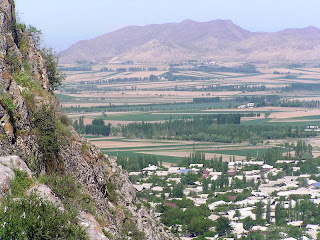Gullia is Muslim and proud of it. Her people in Uzbekistan are all Muslim and it is unthinkable that she could be anything else. She is a pretty 19-year-old student who is into the latest fashions and music just like students all over the world. Gullia has an important exam next week so today she went to a shrine outside the city. She visited the grave of a holy man who is said to have performed many miracles. Gullia tied a small piece of cloth to the iron grill surrounding the shrine before stretching out her palms and praying for the saint to help her. She ran her hands down her face to transfer the blessing and murmured a quick “If God wills.” Orthodox Muslims would condemn this kind of superstition which dates back to the animistic beliefs of pre-Islamic Central Asia. These practices continue today with the frequent use of amulets, charms, curses and fortune telling. Gullia has never read the Qur’an and the only thing she knows about Islam is what her mother has passed on to her. Still, Gullia is proud of her glorious Islamic heritage.
Once she went on a school trip to Samarkand and was amazed by the dazzling tile work of the awe inspiring mosques built by Timurlane. Arab armies brought Islam to Central Asia in the 7th century. By the 14th century Samarkand and the region beyond the Oxus river was an intellectual center of the whole Muslim world. It boasted the most advanced astronomical observatory in the world at that time, while its poets and calligraphers were emulated all over the Middle East. Gullia didn’t hear much about Islam as she grew up since the 70 years of Russian communist rule repressed religious knowledge and belief. Muslim teachers were exiled to Siberia and it seemed that only elderly villagers continued to believe. Since the break-up of the Soviet Union in 1991 more and more Central Asians have become interested in Islam as they seek to recover their historical identity. Gullia’s brother is fed up with the poverty and corruption he sees around him. He has read some Islamic books smuggled in from Afghanistan - but in secret for fear of being arrested and tortured by the police. Gullia herself shudders at the thought of being made to cover up like women in fundamentalist Iran. Some days Gullia wonders if there is another way to get closer to the God who seems so far away….
Once she went on a school trip to Samarkand and was amazed by the dazzling tile work of the awe inspiring mosques built by Timurlane. Arab armies brought Islam to Central Asia in the 7th century. By the 14th century Samarkand and the region beyond the Oxus river was an intellectual center of the whole Muslim world. It boasted the most advanced astronomical observatory in the world at that time, while its poets and calligraphers were emulated all over the Middle East. Gullia didn’t hear much about Islam as she grew up since the 70 years of Russian communist rule repressed religious knowledge and belief. Muslim teachers were exiled to Siberia and it seemed that only elderly villagers continued to believe. Since the break-up of the Soviet Union in 1991 more and more Central Asians have become interested in Islam as they seek to recover their historical identity. Gullia’s brother is fed up with the poverty and corruption he sees around him. He has read some Islamic books smuggled in from Afghanistan - but in secret for fear of being arrested and tortured by the police. Gullia herself shudders at the thought of being made to cover up like women in fundamentalist Iran. Some days Gullia wonders if there is another way to get closer to the God who seems so far away….






